"Champion of Social Justice: The Life and Legacy of Babasaheb
"B.R. Ambedkar: Fighting for Equality and Empowerment in India's Caste System"
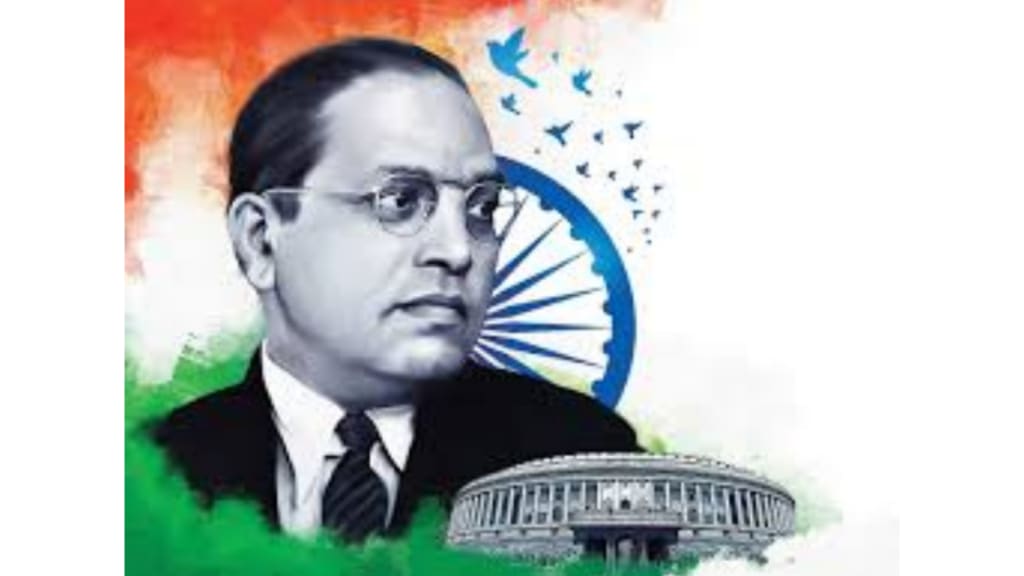
"Exploring the Life and Contributions of Babasaheb Ambedkar: Social Reformer, Political Leader, and Architect of the Indian Constitution"
Babasaheb Ambedkar, also known as Dr. B.R. Ambedkar, was a social reformer, lawmaker, and legal scholar who committed his life to battling for the privileges of Dalits, also called the "untouchables," and other underestimated networks in India. He was brought into the world in 1891 in a Mahar position, which was viewed as perhaps of the least station in the Indian culture.
Ambedkar was the main draftsman of the Indian Constitution and is frequently called the "Father of the Indian Constitution." He assumed an essential part in drafting India's Constitution, which established the groundwork for a majority rule and common country. He was likewise the principal Regulation Pastor of autonomous India.
All through his life, Ambedkar battled against social separation and disparity, upholding for the privileges of Dalits, ladies, and other minimised networks. He established the ideological group, the Conservative Alliance of India, to battle for the freedoms of Dalits and other underestimated gatherings.
Ambedkar died in 1956, yet his heritage lives on, and he is praised as a boss of civil rights and uniformity in India and all over the world..
"Why Babasaheb Ambedkar's Fight for Dalit Rights Led to Landmark Legal Reforms in India"
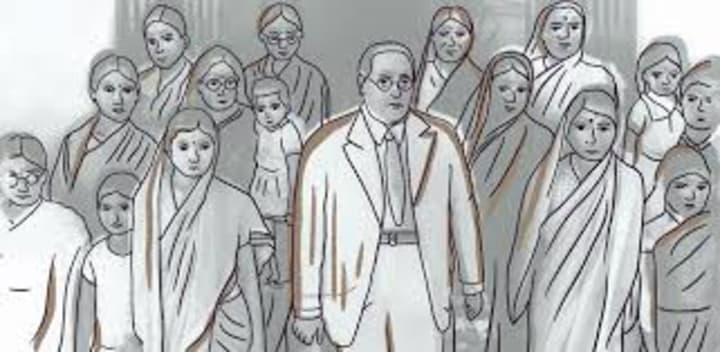
Babasaheb Ambedkar made laws for Dalits because he recognised that they were among the most marginalized and oppressed communities in Indian society. Dalits, also known as "untouchables," were considered to be impure and were subjected to extreme social and economic discrimination. They were denied access to basic amenities like education, healthcare, and housing and were often subjected to violence and atrocities.
Ambedkar believed that the only way to uplift the Dalit community was through legal reforms that would guarantee them equal rights and opportunities. He played a significant role in the framing of the Indian Constitution, which abolished the practice of untouchability and provided for affirmative action measures, such as reservations in educational institutions and government jobs, for the socially and economically backward communities, including Dalits.
Ambedkar also worked towards improving the social and economic status of Dalits through his advocacy for land reform and the abolition of the caste system. He believed that the liberation of Dalits was not just a matter of legal rights but also required a fundamental change in the mindset of the people and the society at large.
Thus, Ambedkar made laws for Dalits to address the centuries-old injustices and inequalities they faced and to ensure that they had equal opportunities and dignity as citizens of India.
"Embracing Babasaheb Ambedkar: The Dalit Perspective"
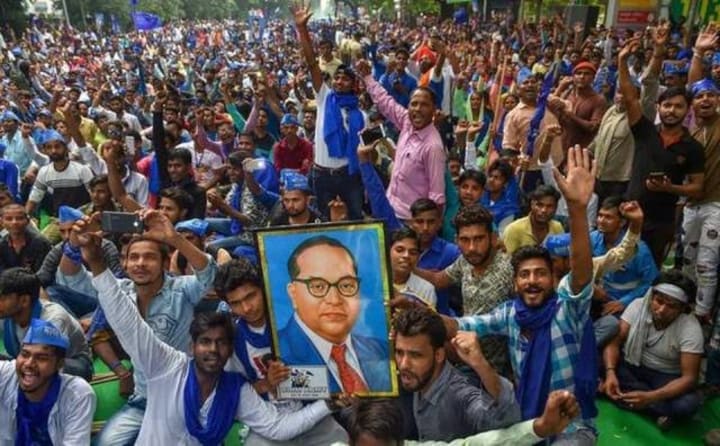
It isn't exact to say that all Dalit individuals in India think about Babasaheb Ambedkar as a divine being, as individuals' convictions and conclusions differ broadly. In any case, Babasaheb Ambedkar is generally regarded and respected among the Dalit people group in India as a result of his eager endeavours towards their upliftment and strengthening.
Babasaheb Ambedkar was a Dalit himself and confronted segregation and persecution all through his life. He turned into a main figure in the Dalit development in India and assumed a vital part in the drafting of the Indian Constitution, which nullified unapproachability and gave a structure to civil rights and uniformity.
His compositions, talks, and activism motivated ages of Dalit individuals to battle against standing separation and imbalance. He likewise changed over completely to Buddhism alongside an enormous number of his devotees, giving an elective otherworldly way to Dalit individuals who were generally rejected from standard Hinduism.
Subsequently, while not all Dalit individuals in India might consider Babasaheb Ambedkar as a divine being, he is unquestionably viewed as a transcending figure and a legend who battled for their privileges and poise....
"Challenging Prejudices and Building a Nation: The Surprising Acceptance of Ambedkar's Laws by Upper Castes".
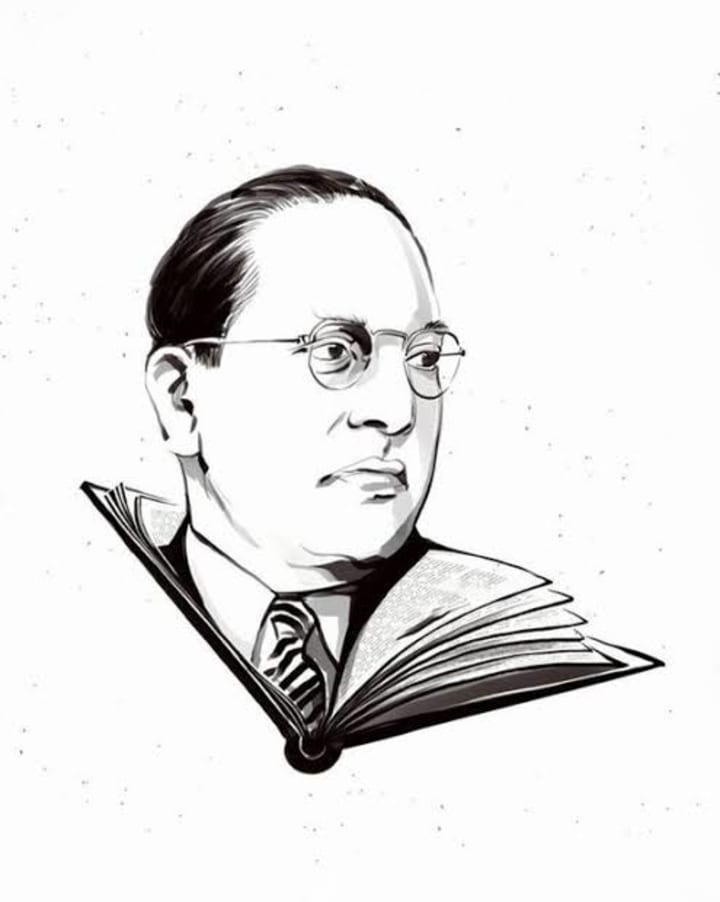
The acknowledgment of the regulations made by Babasaheb Ambedkar for Dalits by upper-standing individuals in India has been a complex and developing cycle. At the point when these regulations were first presented, numerous upper-standing individuals went against them and considered them to be a danger to their favored situation in the public eye.
In any case, over the long run, the regulations made by Ambedkar for Dalits have had a critical effect in diminishing segregation and giving more noteworthy open doors to Dalits to take part in the public eye. Thus, numerous upper-rank individuals have come to acknowledge these regulations and perceive the significance of giving equivalent open doors to all residents.
That being said, there are still occasions of obstruction and resistance to these regulations, and the execution of these regulations can some of the time be trying because of cultural perspectives and biases. Some upper-position people and gatherings keep on clutching their special status and oppose endeavors to advance more prominent social and financial balance.
Generally speaking, while there has been progress as far as acknowledgment of the regulations made by Ambedkar for Dalits, there is still quite far to go as far as completely destroying station based segregation and accomplishing genuine correspondence for all individuals in India.
"Babasaheb Ambedkar's Enduring Legacy: Celebrating His Contributions to Social Justice and Equality Today".
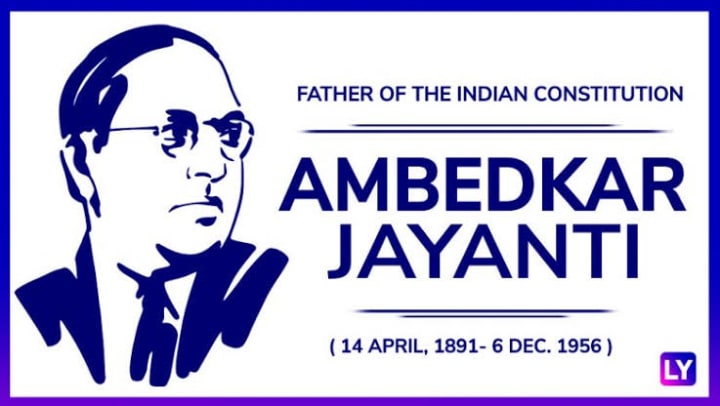
Babasaheb Ambedkar is widely recognized as one of the most influential figures in Indian history, particularly for his work in promoting social justice and equality. Today, people praise Babasaheb Ambedkar in a number of ways:
Celebrating his life and legacy: Many people commemorate Babasaheb Ambedkar's life and work by organizing events, seminars, and conferences on his birthday (April 14th) or other important dates related to his life.
Recognising his contributions: People today recognize Ambedkar's role in drafting the Indian Constitution and his advocacy for the rights of Dalits, women, and other marginalized communities.
Spreading awareness of his ideas: Many organizations and individuals today use social media, literature, and other platforms to promote Ambedkar's ideas and teachings, such as the importance of education, social equality, and the abolition of caste.
Continuing his work: Several organizations and groups work towards continuing the social justice work started by Ambedkar. For instance, there are groups that work towards the eradication of caste-based discrimination, provide education to the underprivileged, and fight for the rights of marginalized communities.
Overall, people today praise Babasaheb Ambedkar for his immense contributions to Indian society and his unwavering commitment to social justice and equality.
"An exploration of the enduring impact and relevance of Ambedkar's ideas on democracy, equality, and human rights across India and beyond."
Babasaheb Ambedkar is widely regarded as one of the most important figures in modern Indian history. He was a social reformer, political leader, jurist, economist, and philosopher who devoted his life to fighting for the rights of marginalized communities, particularly the Dalits, who were considered the lowest of the low in the traditional caste system.
Today, Ambedkar is revered as a visionary leader and a champion of social justice, not just in India but around the world. His ideas and writings on democracy, equality, and human rights continue to inspire people in their struggles for a more just and equitable society.
Ambedkar's legacy is particularly strong among Dalits and other marginalized communities in India, who view him as a hero who fought for their rights and dignity. His teachings have inspired many Dalit activists and leaders to continue his work and fight for a more equal and just society.
Ambedkar's influence has also extended beyond India's borders, as his ideas and writings have been studied and admired by scholars, activists, and policymakers around the world. In particular, his work on the intersection of caste, race, and class has influenced debates on social justice and equality in many countries.
Overall, Babasaheb Ambedkar is widely respected and admired as a visionary leader and champion of social justice, whose ideas continue to shape debates on democracy, equality, and human rights around the world.
"Babasaheb Ambedkar: The Architect of India's Constitution and a Fighter for Social Justice"
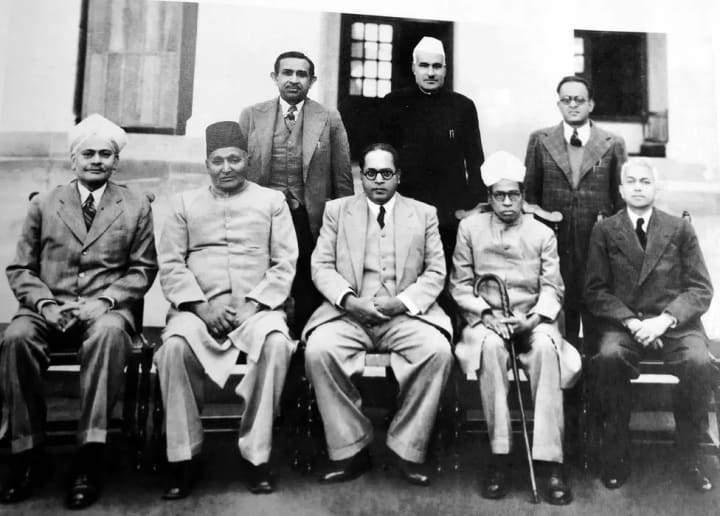
As a freedom fighter, Ambedkar played a vital role in the Indian freedom struggle. He was a member of the Executive Council of the Viceroy of India in 1942 and served as the Chairman of the Drafting Committee for the Indian Constitution in 1947. He fought for the inclusion of fundamental rights in the Indian Constitution, such as the right to equality and freedom from discrimination based on caste, religion, or gender.
Apart from his political activities, Ambedkar also worked tirelessly for the betterment of the Dalit community. He founded the Bahishkrit Hitakarini Sabha in 1924 to improve the social and economic conditions of the Dalits. He also established the Independent Labour Party in 1936 to represent the interests of the working class and the oppressed.
Ambedkar's contributions to India's freedom struggle and social reform movements have made him a revered figure in Indian history.
BR Ambedkar: The unknown details of how he piloted Indian constitution......
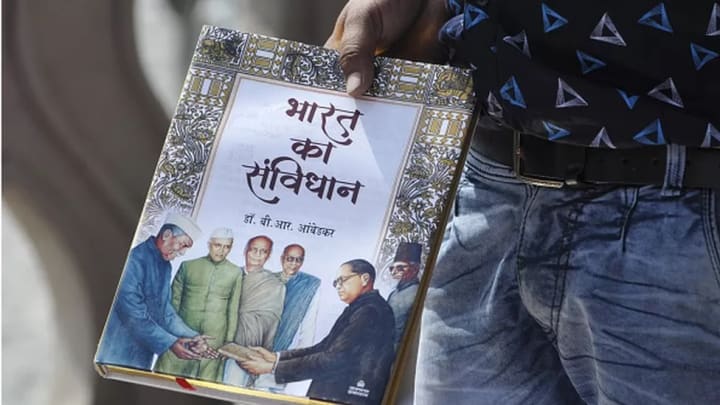
At the end of the final reading of India's constitution on 25 November 1949, Dr Bhimrao Ambedkar, one of India's greatest statesmen and the undisputed leader of the country's Dalits (formerly called 'Untouchables'), delivered a typically prescient speech.
"On the 26th of January 1950, we are going to enter into a life of contradictions. In politics we will have equality, and in social and economic life, we will have inequality," Ambedkar said.
With the constitution coming into force, India declared itself as a sovereign, democratic and republic state that day. In his speech, Ambedkar was possibly alluding to the contradictions between a young republic and an old civilisation. Democracy, he had said separately, was only a "top-dressing on Indian soil" which was "essentially undemocratic", and the village was a "sink of localism, a den of ignorance, narrow-mindedness and communalism".
Why are statues of Indian icon Ambedkar being caged?
Abolition of untouchability, affirmative action, giving the ballot to all adults and decreeing equal rights to all was a remarkable feat for a poor and unequal country like India - a land that had remained "stationary and fixed" in the words of celebrated German philosopher Georg Wilhelm Friedrich Hegel.
A 299-member constituent assembly had worked for three years between 1946 and 1949 through a tumultuous time. The period saw religious rioting and partition, which sparked the largest migration in human history between India and the new state of Pakistan. It also witnessed the painful and difficult incorporation of hundreds of princely states into India.
Ambedkar, a legal scholar himself, helmed a key seven-member panel which drafted the document with its 395 provisions.
Now a magisterial new biography called A Part Apart by Ashok Gopal tells the story of how Ambedkar battled poor health and set aside differences with the leading lights of India's freedom movement to pilot what was one of the world's longest founding documents.
The book reveals how Ambedkar's stature helped him secure widespread local - and international - support for the role. Five of the seven members of the drafting committee were upper castes, but they all asked Ambedkar to lead the committee.
Eamon De Valera, the Irish statesman who supported the Indian freedom movement and wrote a Constitution of Ireland, also recommended Ambedkar for the position either to Lord Mountbatten, last viceroy of British India, or India's first prime minister Jawaharlal Nehru, Mr Gopal writes. (This was revealed in a letter that Edwina Mountbatten, the last vicereine, wrote to Ambedkar.)
Why the West is reckoning with caste bias now
Edwina Mountbatten also told Ambedkar that she was "personally glad" he was "supervising" the constitution making, as he was the "only genius who can give equal justice to every class and creed". Soon after taking over as the viceroy in March 1947, Lord Mountbatten had "extremely interesting and valuable talks" with Ambedkar, Mr Gopal writes. The viceroy also told a senior British official that he "felt great satisfaction" when he saw Ambedkar's name on the list of 15 ministers in Nehru's interim federal cabinet.
Ambedkar's panel examined the entire draft of the constitution, which had been submitted to the assembly in May 1947. It was sent to relevant ministers and then to the Congress party. Some sections were redrafted as many as seven times.
Atlast... here's some 16 Famous quotes by Dr Babasaheb Ambedkar you ought to know..
- “They cannot make history who forget history”.
- “Be Educated, Be Organised and Be Agitated”
- “I like the religion that teaches liberty, equality and fraternity”
- “Life should be great rather than long”.
- “If I find the constitution being misused, I shall be the first to burn it.”
- “Cultivation of mind should be the ultimate aim of human existence”.
- “If you believe in living a respectable life, you believe in self-help which is the best help”.
- “We must stand on our own feet and fight as best as we can for our rights. So carry on your agitation and organize your forces. Power and prestige will come to you through struggle”
- “The history of India is nothing but a history of a mortal conflict between Buddhism and Brahminism”.
- “I measure the progress of a community by the degree of progress which women have achieved.”
- “Men are mortal. So are ideas. An idea needs propagation as much as a plant needs watering. Otherwise, both will wither and die.”
- “Every man who repeats the dogma of Mill that one country is no fit to rule another country must admit that one class is not fit to rule another class.”
- “The relationship between husband and wife should be one of closest friends.”
- “Political tyranny is nothing compared to social tyranny and a reformer who defies society is a more courageous man than a politician who defies Government.”
- “A great man is different from an eminent one in that he is ready to be the servant of the society.”
- “Law and order are the medicine of the body politic and when the body politic gets sick, medicine must be administered.”
About the Creator
Vivek Gurnani
Choosing Expression Over Impression."wanna Go too Farrrrrrrr"...






Comments
There are no comments for this story
Be the first to respond and start the conversation.